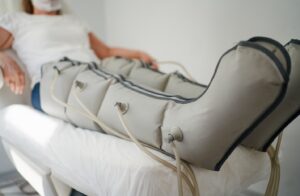The Benefits of Compression Therapy
 If you’ve got circulation issues, compression therapy may be something to consider. A medical practice going back thousands of years, compression therapy uses things like compression stockings, bandages, socks, and boots to gently put pressure on the leg. This has a wide range of applications and can help with a variety of problems.
If you’ve got circulation issues, compression therapy may be something to consider. A medical practice going back thousands of years, compression therapy uses things like compression stockings, bandages, socks, and boots to gently put pressure on the leg. This has a wide range of applications and can help with a variety of problems.
- Compression therapy promotes healthy blood flow. Whenever you’re sitting or standing, your blood has a hard time efficiently circulating against the pull of gravity. With compression therapy, these veins have an ally. The gentle squeezing of the legs helps to keep the blood flowing in the right direction.
- Varicose veins can be prevented or treated using compression therapy. There are valves in the veins in your legs that are designed to keep blood flowing in only one direction. If these valves become damaged or worn out, the blood can pool in the vein and cause varicose veins. Varicose veins look swollen and twisted, and they can be painful and make your legs feel heavy. Compression stockings provide pressure that reduces discomfort and swelling. Compression stockings provide pressure that reduces the discomfort and swelling and can even help prevent new varicose veins from forming after varicose vein treatment.
- The pressure of compression therapy can reduce swelling in the legs. Compression socks are useful when you have to stand or sit for long periods of time because they can prevent fluid from leaking out of your legs’ small blood vessels. Many people wear compression socks at a job that requires a lot of standing or on a long flight. Pregnant women also find them useful, because compression therapy helps your body absorb excess fluid from the legs.
- Compression therapy can help treat orthostatic hypotension. This is a condition in which the blood pressure drops when a person stands up, causing dizziness, lightheadedness, or nausea. If this happens to you frequently, talk to your doctor about whether thigh-high or waist-high compression hose can help you. Compression therapy can often help with this condition if it’s caused by blood pooling in the legs. There’s even research to indicate that pregnant women may experience less morning sickness and dizziness while wearing compression stockings.
- Using compression therapy can reduce the risk of blood clots. This is why patients who have surgery or are in the hospital for a long time often need to have compression therapy while they’re hospitalized and wear compression stockings once they go home. Lowering your risk of blood clots can help keep you from developing deep vein thrombosis, which can be extremely serious. Surgical patients aren’t the only ones at risk for deep thrombosis, though. Travelers who are seated on long flights for an extended period use compression socks to decrease discomfort and lower the risk of blood clots.
- People with leg ulcers can benefit from compression therapy. Leg ulcers caused by diabetes, vein problems, kidney failure, high blood pressure, or heart disease are open wounds on the skin that heal slowly and poorly. Compression therapy increases blood flow and helps heal ulcers while also reducing the symptoms of leg ulcers: pain, swelling, and itching.
If you’re seeking the very best care for your vein and blood flow issues, trust the board-certified physicians at the Arizona Vein & Laser Institute. Using the most advanced technology, the vascular and cardiovascular surgeons at the Arizona Vein & Laser Institute provide care for all types of venous diseases. With over 40 years of experience, our team of experienced physicians can devise the right treatment plan to address your venous disease problems. For more information contact us through our website.
